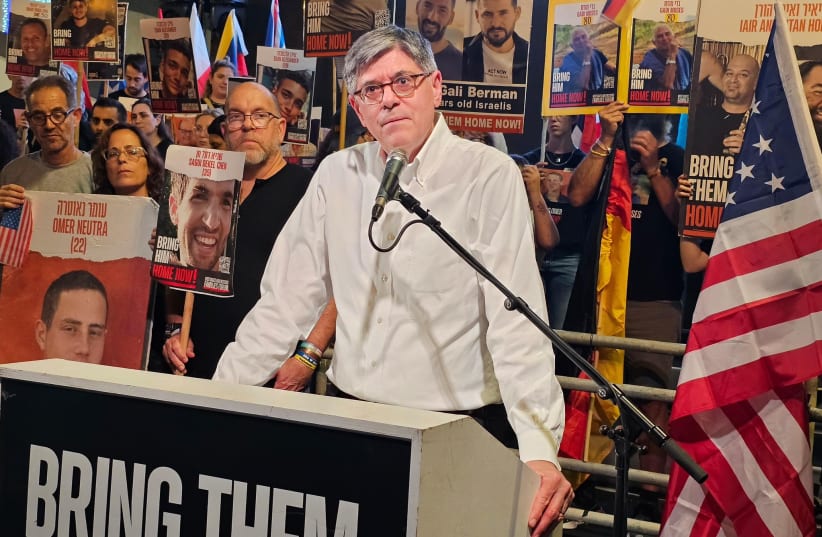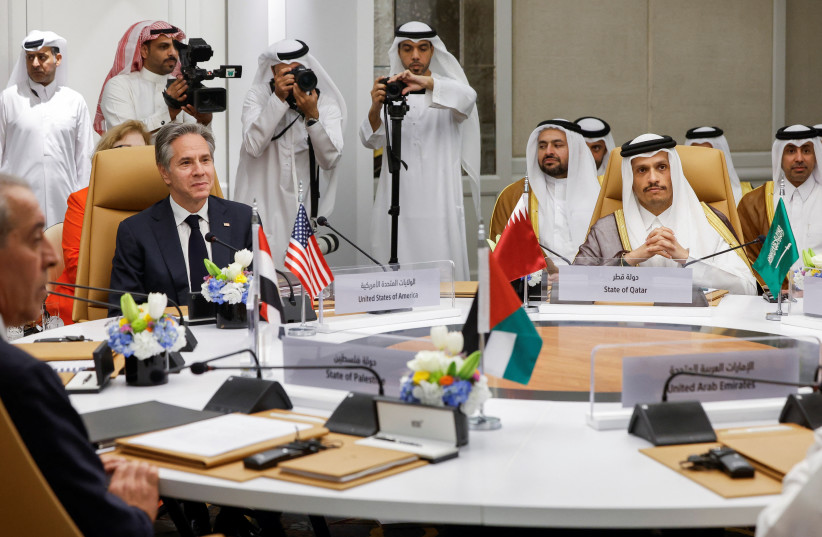A two-state resolution to the Israeli-Palestinian conflict is a defeat for Hamas, US Ambassador to Israel Jack Lew told The Jerusalem Post as the Biden administration is advancing a Saudi deal that includes a pathway for Palestinian statehood.
“I don’t think Hamas wants two states,” Lew said. “The only time they indicate they want two states is when they’re trying to put a little bit of a patina of legitimacy around their real strategy, which is the elimination of the State of Israel.”
The tall, soft-spoken envoy took his post on November 3, less than a month after the Hamas-led October 7 invasion in which over 1,200 people were killed and another 252 seized as hostages.
The former US secretary of the Treasury and White House chief of staff spoke with The Jerusalem Post in advance of its annual conference in New York on Monday, where he had initially hoped to appear.
“I regret that I can’t be at the conference because of obligations to be in Washington. But I’m happy to have an opportunity to talk [to the paper],” he said, adding that this was an important time to hold a conversation on Israel in New York.
Lew has been on the frontlines of helping steer the American-Israel relationship during a time of war, while simultaneously advancing a triad Saudi deal. It’s an agreement that includes a Washington-Riyadh defense pact, Israeli-Saudi normalization, and a pathway to Palestinian statehood.
Chasing Saudi normalization
Prime Minister Benjamin Netanyahu has long sought a Saudi normalization deal but has balked at talk of Palestinian statehood particularly in the aftermath of October 7. Both he and his government believe Palestinian statehood rewards terrorism and legitimizes that brutal style of attack in which people were raped, dismembered, and burned alive.
Lew said he believed that the opposite is true, particularly if Palestinian statehood is achieved through the framework of a larger Saudi deal, which would place Israel within a regional alliance against Iran.
“I think it’s a defeat for Hamas to talk about a two-state solution, which is why I think even out of the pain of October 7, there is a way to have this conversation, but it takes leadership,” Lew said.
A Saudi deal “would be a strategic move that would be transformative in terms of isolating Iran, with its proxies on one side and Israel with the moderate Arab world and the Western world on the other side,” he explained.
To underscore his point, he pointed to the coordinated defense of Israel against an Iranian drone and missile attack in April.
“The fact that you had European allies like the UK and France both flying and shooting on one side and allies of the US – Jordan and Saudi Arabia – covering the airspace on the other side, gave you the visibility and the time to have” an “extraordinary” outcome, he said.
“It was a real-life demonstration of the value of strategic cooperation,” he said, adding that it was an example of how a regional alliance against Iran would also operate in the future.
But to get there, he said, there has to be talk about two states. The United States has long believed that two states is the correct resolution to the conflict, Lew said, adding that “this is the third administration I’ve served that’s believed that. So it’s not a new idea.” He clarified that such a state would be a demilitarized one.
“We have never advocated supporting the unilateral declaration of a Palestinian state. We made that clear in the UN,” Lew said, adding that the declarations of unilateral statehood by four European countries in May were “counterproductive” to a peace process.
“Actions by other countries to unilaterally recognize a Palestinian state outside of the context of an agreement with Israel will not work, and the recent announcements of several countries do not help advance the process of a negotiated outcome,” Lew said.
“If you really wanted to defeat Hamas and if you really want to defeat Iran, normalization with Saudi Arabia is a way to accomplish both of those goals,” he said.
Looking at the pathway for two states that would be part of that deal as a defeat for Hamas makes such a conversation possible, Lew said. No one expects Israel “to decide on two states next week or next month,” but it has to be open to the conversation, he said.
“The basic orientation” should be: is this “a win or a loss for Hamas? Is it a win or a loss for Iran?” Lew said.But to arrive at a deal, Lew said, there must be a cessation of hostilities between Hamas and Israel, particularly given that the war has entered a phase, where success might better be achieved through diplomacy than on the battlefield.
Lew initially spoke with Post last week as he sat at the former US embassy building in Tel Aviv, a city that days earlier had been attacked by Palestinian rockets from Gaza, and talks for the release of the remaining 125 hostages appeared to be at a standstill.
Outside his window, summer waves pounded the stone breakwaters protecting the sandy beach shore. Inside, Lew was unshakable in his optimism that peace was possible, as was a deal to bring everyone home.
Lew didn’t even want to contemplate a scenario in which a hostage deal was impossible.
“It has to be possible,” Lew said, particularly given the lives that are at stake.
“I don’t think a government of the United States will change its view that it’s absolutely necessary to resolve the hostage issue” and that the same was true in other capitals, he added.
Lew drew hope from the November deal in which 105 captives were released in exchange for a lull in the fighting.At the time, he said, “There were a lot of reasons to be doubtful that the hostage deal would be concluded and if it was concluded that it would be implemented, and it was.”
The issue is an urgent one for the president and CIA head William Burns, who has “put his heart and soul into keeping people engaged in a conversation,” Lew said, adding that “we’re totally committed to staying engaged until it succeeds.”
“Negotiations are hard. Nobody ever wants to negotiate against themselves. Nobody wants to make concessions for things that are very difficult at a time when you don’t think it’s going to close the deal.
“Whatever leverage we have, we have to make it work... There’s leverage being created by the United States and others putting pressure on Qatar and Egypt to put pressure on Hamas. There’s leverage being created by military operations. So it’s not a static point in time. We have to just keep pressing on every part of the system,” he said. It’s important that everyone stays engaged in the negotiation and even more importantly it succeeds, Lew stated.
On Friday, US President Joe Biden put forward a three-phase proposal for a hostage deal, which Israel has approved. It attempted to create a bridge between Hamas’s insistence on a permanent ceasefire, while Israel has said it must be free to totally defeat Hamas.
“Israel has put a proposal on the table that Hamas should accept – it is a framework for releasing the hostages and ending the war in phases while assuring that Israel has the right to defend itself,” Lew said on Sunday.
The first phase would see the humanitarian release of female, ill, and elderly hostages as well as a lull to the fighting. The remainder of the live hostages would be freed in the next phase, where there would also be a window for diplomatic activity, such as advancing the Saudi deal.
That phase, Lew said, would open an “opportunity to resolve the critical strategic issues of a diplomatic agreement to avoid a war in the North and to normalize relations between Israel and Saudi Arabia.
“Hamas should accept the deal, and we will work with Israel to achieve these important strategic outcomes,” he said.
Part of the process of looking at what happens in Gaza the day after the war, he said, is for Israel to put forward a credible plan for the enclave, particularly one that would make donor countries feel safe in helping to reconstruct the Strip.
“Other Arab countries are only likely to fund the reconstruction of Gaza if there is a credible plan for sustainable order in Gaza,” Lew said.
“There is a broad understanding that transitional issues will be challenging, but there will need to be a credible plan to avoid either chaos, Hamas rule, or permanent Israeli control,” he said.
“Governance in Gaza will need to involve Palestinians, and cannot be Hamas. Most civil servants in Gaza have worked for the Palestinian Authority. They will need to do the work, and there may need to be a transitional arrangement acceptable to all parties as the Palestinian Authority is being reformed,” he added.
Lew underscored the strength of US-Israeli relations, noting that the differences between the two countries over the Gaza war were tactical and not strategic, given that both governments agreed that Hamas must not be allowed to remain in Gaza.
Biden’s support for Israel has been ironclad, Lew said.
“Anyone who knows him knows it’s not coming from political winds. It’s coming from his heart and his head. It’s not coming from the last week’s briefing. It’s coming from a lifetime of commitment.”
In visiting Israel within weeks of the October 7 attack, Lew explained, Biden was “playing a role that he so often has played in the United States of being kind of a pastor, providing moral and psychological support for people who are hurt.”
More significantly, Biden ensured that Israel had the military support it needed to fight the war.
“I had never seen more sustained or faster” military support for an ally, Lew said.
Biden’s objections to Israeli actions in Gaza have been very narrowly drawn and focused on the importance of providing humanitarian assistance, Lew explained. The president has also spoken to the “question of, how do you fight in densely populated spaces and what munitions are appropriate or inappropriate to use,” Lew added.
The Biden administration has stressed that Israel must battle Hamas in a manner that’s consistent with international law” and to “provide humanitarian assistance to a civilian population.”
Biden’s criticism of IDF actions in Gaza and his decision to delay one shipment of arms of 2,000- and 1,500-pound bombs has been overblown by his opponents and described in language “that’s just completely out of proportion to the action taken,” Lew said.
“I think the president’s made clear he thinks using 2,000-pound bombs in a densely populated area is something he can’t support,” Lew said.
He objected in particular, to the contention that the delay in the shipment was tantamount to an arms embargo.“You know what happened the week that one shipment… was held, not canceled?” he asked.
“That same week, precision-guided munitions were shipped... $850 million [or so] of remaining appropriations from prior years was committed,” Lew stressed. There was also a commitment that “the full amount of the supplemental appropriation would be expended.”
Moving forward, he said “I don’t see the president bending to political pressure [on Israel.] He’s been operating with a moral compass.”
It’s very clear to Biden, Lew said, that “Israel has a right and a responsibility to defend itself.” •

